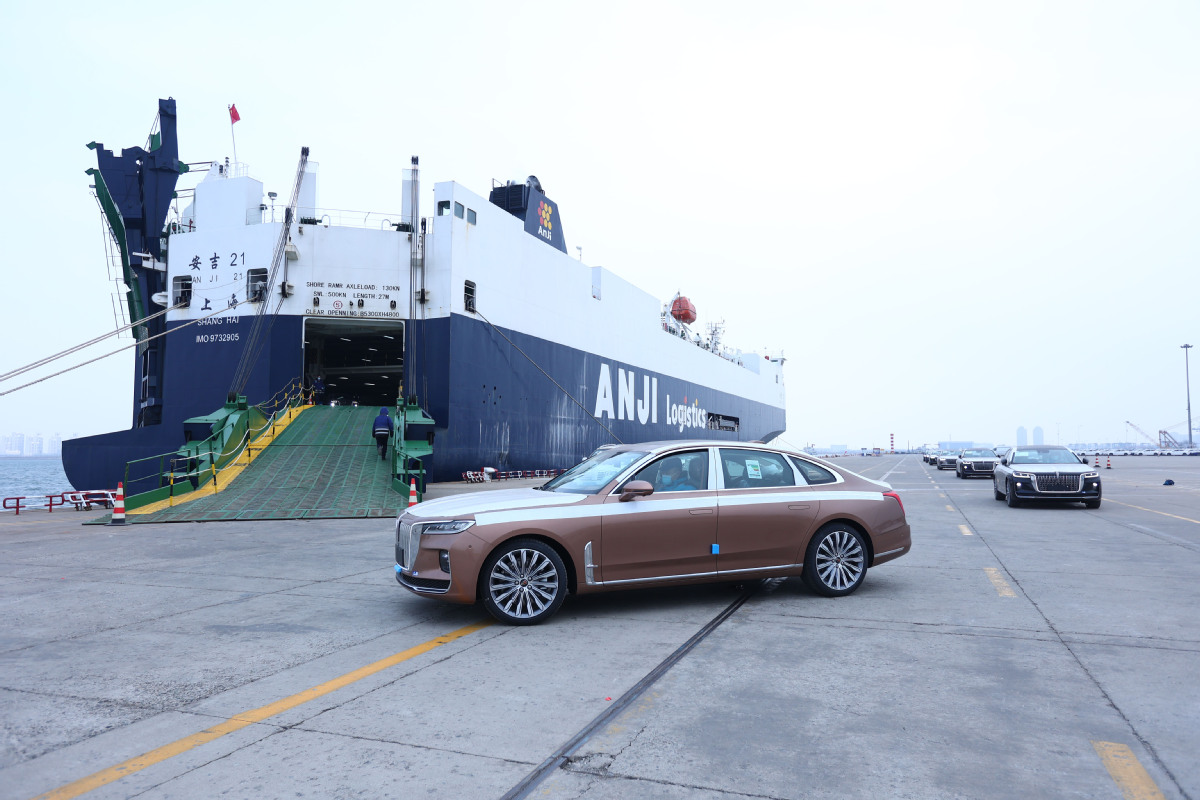Electric vehicles power China's auto exports


Vehicles made in China are gaining popularity in overseas markets, driving exports from the world's largest auto market to a record high.
Over 1.36 million vehicles were shipped overseas in the first three quarters, said the China Association of Automobile Manufacturers.
That is around 1.2 times the figure from January to September in 2020 and a 51 percent rise compared with the same period in pre-COVID 2019.
Xu Haidong, deputy chief engineer of the association, said the surge in exports is related to changes in global vehicle production.
GM and Ford are shutting money-losing plants in some Asian countries, including India and Thailand.
Chip shortages and the COVID pandemic are forcing carmakers from Toyota to Volkswagen to cut their production as well.
Chinese carmakers have also felt the shortage of semiconductors, which contributed to a reduction in combined projections for production of around 2 million units in 2021. However, thanks to effective COVID controls, vehicle supplies from China have been comparatively plentiful.
In the first nine months, 18.24 million vehicles were made in China, up 7.5 percent from the same period in 2020, according to the CAAM.
China has become a major producer of Tesla models for global markets, with over 100,000 exported this year.
"Due to strong US demand and global average cost optimization, we have completed the transition of Gigafactory Shanghai as the primary vehicle export hub," Tesla said in July. Gigafactory is the name the company has given to facilities that centralize production.
The fundamental reason for the growing popularity of Chinese brand vehicles is their improving quality and service, which enhances their reputation, as well as novel features largely absent in rival products, Xu said.
SAIC Motor Corp, China's largest vehicle-maker by sales, sold over 441,000 vehicles overseas in the first three quarters of this year, up 99.6 percent from the same period last year.
The carmaker expects sales to reach 550,000 units during the whole year.
SAIC Motor has set up around 1,000 dealerships and service outlets in some 70 countries and regions.
Of them, big markets include Europe, the Middle East, Australia and New Zealand, ASEAN countries and India.
SAIC's guiding strategy is to offer new and different options, said Yu De, managing director of SAIC's international business department.
In emerging markets, for example, the carmaker highlights its smart connected vehicles-which can connect to the internet and communicate with other devices-while in developed markets like Europe, new energy vehicles have served as an entry point.
Xu at the CAAM said new energy vehicles are a good way for carmakers to explore the European market.
European countries are offering generous subsidies to buyers of new energy vehicles, but most local products are hybrids, which creates a competitive edge for pure electric vehicles that Chinese carmakers excel in making.
In the first half of this year, SAIC delivered over 12,000 electric vehicles and plug-in hybrids in Europe, accounting for almost 60 percent of all its sales on the continent.
"Our rivals are local European brands. In France, they are Renault, Peugeot and Citroen," said Liu Xinyu, president of SAIC's French subsidiary.
Liu said SAIC's success in Europe lies in its products and services.
"Our two models in France have 5-star safety ratings and we offer a seven-year warranty, which is the longest in the market," Liu said.
Maxus, a SAIC subsidiary, sold 5,446 vehicles in Europe in the first half of this year, up 187 percent from the same period last year.
Many of Maxus' big customers in Europe are delivery firms, including Royal Mail, Irish National Post, DHL and FedEx.
"We recently beat Renault and Mercedes and won an order for 750 units from DPD's British subsidiary. We have similar prices and what make us stand out is our products," according to a statement from the carmaker.
The order from delivery company DPD marked the largest single British order for China-made vehicles.
Iceland's oldest shipping company, Eimskip, has placed orders for Maxus' vans, which will be the first electric vehicles in its fleet.
Harris Automotive, Maxus' sole agency in the United Kingdom, expects the brand's sales to at least triple this year in the country.
"Maxus has become a leader in the UK's electric vehicle sector, and our success in this area will only continue as electric vehicles become more and more popular in the years ahead," said Mark Barrett, general manager of Harris Automotive.
Besides its products and services, SAIC has also worked to be part of markets where it is present, which is crucial to any company's overseas operations.
"When we enter a market, we want to join the local community and engage in social responsibility," Yu said.
Yu said over 70 percent of SAIC's overseas employees are locals. The company sponsors concerts and soccer games, and has worked for the public good during the pandemic.
"We are not a small company, and we don't just come and go. We live and work there together with them, and love things they love," he said.
Other Chinese carmakers such as BYD, Nio and Xpeng have entered European markets as well.
In September, BYD shipped over 1,000 electric Tang SUVs to Norway, the country which has seen the quickest growth in electric cars.
BYD's first Norwegian customer, Per Lian, a salesman at a building ventilation company, said Norwegians would have no qualms about buying Chinese cars given the affordable price and good range.
"I feel the quality is good. Most important are the prices-if you want to buy a Tesla, it is maybe double," Lian said in an interview with the Financial Times.
Thanks to its vehicle quality and battery technology, BYD is the bestselling new energy vehicle maker in China.
Last month, it delivered over 70,000 vehicles to Chinese customers, 20,000 more than Tesla.
XPeng started to export its smart electric coupe P7 to Norway in August, after its G3 had made its way to the European market almost a year earlier.
One month later, Chinese startup Nio opened its first European showroom in Oslo, Norway, with another four planned in 2022.
The first model is its flagship SUV ES8, which rivals products from premium brands such as Audi and Mercedes-Benz.
Nio said the second model will be the ET7 sedan, which will arrive in Norway in 2022.
The carmaker also is building battery-exchange stations in the country.




































